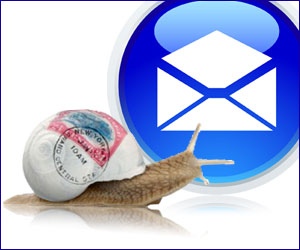I am terrified of cockroaches. The high-pitched-screaming, jumping-on-a-chair, shaking-in-my-boots kind of terrified. Before my department moved into the lovely facility I work in now, the labs were located in a rather dilapidated building that was infested with South American cockroaches. They usually hung out in the autoclave room, but every so often they would venture out for a joyride in the elevator. After discovering this the hard way, I exclusively took the stairs. [Continue Reading…]
Flyceum: Your Science. Your Career.
We’re following in the tradition of open discussions among scientists that has resulted in important advances in both science and society.
From Academic Bench Chemist to Freelance Science Writer
by
 Given that finely-honed writing skills are an essential component of successful research, it should come as no surprise that many graduate students and postdocs gravitate toward science journalism as a career option. What is surprising, however, is the lack of guidance we’re given in pursuit of this goal. To see how one scientist made the transition, we spoke with Katharine Sanderson, freelance science writer and former chemist, about her unconventional path to journalism and the lessons she’s learned along the way.
Given that finely-honed writing skills are an essential component of successful research, it should come as no surprise that many graduate students and postdocs gravitate toward science journalism as a career option. What is surprising, however, is the lack of guidance we’re given in pursuit of this goal. To see how one scientist made the transition, we spoke with Katharine Sanderson, freelance science writer and former chemist, about her unconventional path to journalism and the lessons she’s learned along the way.
The Forgotten Element of Graduate School: Coursework
by
 A member of my dissertation committee once remarked “Grades will keep you in graduate school but research will get you out.” The implication was that coursework is a necessary evil on the road to a Ph.D. Indeed, most of the discussions on BenchFly focus on research projects, research advisors, scoring the big paper or passing the dreaded prelim exam. However, the fact is that graduate students spend most of their first year-and-a-half or two years taking courses while they do research rotations and begin their research projects. Someone is paying for that coursework, students are spending a lot of time taking it, and faculty are spending time teaching it. So what is everyone getting for their money and time?
A member of my dissertation committee once remarked “Grades will keep you in graduate school but research will get you out.” The implication was that coursework is a necessary evil on the road to a Ph.D. Indeed, most of the discussions on BenchFly focus on research projects, research advisors, scoring the big paper or passing the dreaded prelim exam. However, the fact is that graduate students spend most of their first year-and-a-half or two years taking courses while they do research rotations and begin their research projects. Someone is paying for that coursework, students are spending a lot of time taking it, and faculty are spending time teaching it. So what is everyone getting for their money and time?
Walking the Thin Line Between a Great Result and a Lie
by
My PI often overstates my results when he presents my work in talks. How do I know if it’s just a little bit of hype versus being a lie, or even worse unethical?
– TJ, grad student
How to Contact Potential Postdoctoral Advisors: Email vs. Snail Mail
by
 To say email changed the way we communicate is like saying Saturday morning group meeting is a bad idea – it’s obvious. For most of us, email (including messaging through Facebook and related sites) is the reason we write with the penmanship of a second-grader. (For those born after 1990, “writing” means holding a pen in your hand and physically creating the letters and words on a piece of paper that would then be mailed to the recipient. “Mail” means…) Since it’s inception, people have debated the appropriateness of sending an email versus a physical letter for a range of life’s occasions. In our professional lives we fear choosing the wrong vehicle will put an end to our candidacy before our merits are even considered. Accordingly, one of the most common questions we receive from the lab is whether we should contact potential postdoctoral advisors by email or a traditional letter.
To say email changed the way we communicate is like saying Saturday morning group meeting is a bad idea – it’s obvious. For most of us, email (including messaging through Facebook and related sites) is the reason we write with the penmanship of a second-grader. (For those born after 1990, “writing” means holding a pen in your hand and physically creating the letters and words on a piece of paper that would then be mailed to the recipient. “Mail” means…) Since it’s inception, people have debated the appropriateness of sending an email versus a physical letter for a range of life’s occasions. In our professional lives we fear choosing the wrong vehicle will put an end to our candidacy before our merits are even considered. Accordingly, one of the most common questions we receive from the lab is whether we should contact potential postdoctoral advisors by email or a traditional letter.
Facebook Updates: The Good, The Bad, and the Vague
by
 One of my biggest pet peeves is “vague-booking”. You know, when people change their Facebook status to read “sigh” or “really?” or “I can’t believe that just happened :(“. Vague with a capital “V”. I know that the author of these atrocities just wants someone to ask them what happened, or express concern that they had a tough day, but my response is the exact opposite. To put it gently, I start to dislike the vague-booker.
One of my biggest pet peeves is “vague-booking”. You know, when people change their Facebook status to read “sigh” or “really?” or “I can’t believe that just happened :(“. Vague with a capital “V”. I know that the author of these atrocities just wants someone to ask them what happened, or express concern that they had a tough day, but my response is the exact opposite. To put it gently, I start to dislike the vague-booker.
Dear Boss: I Want to Graduate. Let’s Talk.
by
What’s the best way to get the conversation going about graduation dates with your PI?
– Henry, grad student
Scared of Dropping the Soap? Worry No More.
by
 I realize that my audience here at BenchFly probably doesn’t contain a large number of prisoners, but I never claimed to cater to the majority. Also, you never know when you might end up incarcerated (wrongfully, obviously), so having a few science-y tricks up your sleeve is not a bad idea. And while this may not be a recipe for breaking out by dissolving the bars to your cell, it could make life on the inside a little better.
I realize that my audience here at BenchFly probably doesn’t contain a large number of prisoners, but I never claimed to cater to the majority. Also, you never know when you might end up incarcerated (wrongfully, obviously), so having a few science-y tricks up your sleeve is not a bad idea. And while this may not be a recipe for breaking out by dissolving the bars to your cell, it could make life on the inside a little better.
Hiring the PI’s Spouse and the Effect on Lab Morale
by
 “In group meeting today, I’d like to welcome a new member to our group, Agent Zero.”
“In group meeting today, I’d like to welcome a new member to our group, Agent Zero.”
“Agent Zero?!” You whisper, leaning over to a labmate sitting next to you.
“What are you talking about? He said ‘Dr. McIntyre’ – it’s his wife.”
“Then why does she keep turning her head and covertly talking into her shirt sleeve?”
“That’s called covering your mouth when you cough. By the way, take notes on that one.”
“Something’s going on here.”
“Yeah, you need to step away from the solvents before coming to group meeting.”
My Boss’ Spouse: A Spy or Civilian in Lab?
by
My PIs wife just started working in the lab and it’s made things really awkward since everyone assumes she’s a spy for the boss. Is there anything we can do?
– biokid, graduate student





